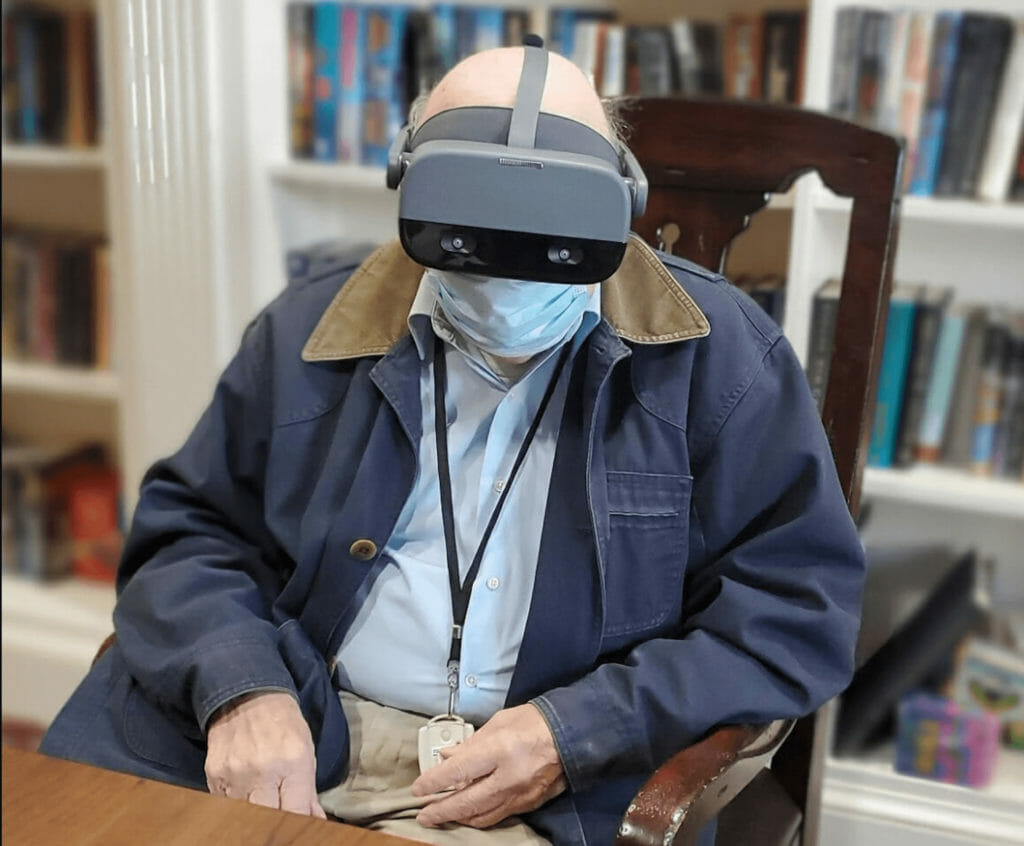
Senior living residents are furthering the understanding of aging through pilot programs in their communities even while they cope with the effects of a global pandemic.
Assisted living and memory care residents of LCB Senior Living communities in Massachusetts and Connecticut are piloting technology from Cambridge, MA-based REACT Neuro to evaluate the brain’s micro-changes over time. LCB plans to aggregate the information to set benchmarks to tailor programming and services for residents.
Each week, 150 residents don a specialized headset equipped with interior cameras and a microphone. Using an iPad application, the device digitally administers five-minute cognitive tests — such as the Trail Making Test, the Stroop Color and Word Test, and category fluency — that were previously conducted with pencil and paper.
The initiative seeks to transform brain wellness by making digital cognitive checks a standard tool in healthcare, similar to blood pressure readings, cholesterol testing and other practice steps to address physical well being.
“For age-related diseases below the brain, such as heart disease, we detect problems early so we can try to stop them before symptoms appear,” said REACT Neuro co-founder Rudolph Tanzi, Ph.D., who identified the first Alzheimer’s gene. “However, we only diagnose diseases such as Alzheimer’s and Parkinson’s when the brain has gone downhill to the point the conditions become symptomatic. We need to nip these diseases in the bud, well before symptoms start showing.”
The first data should be available in early 2021, according to LCB.
“In working with REACT Neuro, we are developing programs to provide residents with the most sophisticated cognitive health technology,” LCB CEO Michael A. Stoller said. “Furthermore, through this initiative, our residents are helping transform the future of brain wellness, a mission that is gratifying and exciting for everyone in our organization.”
LCB and REACT Neuro began working together in 2019 to refine the concept and application of the technology, which originally was developed to better diagnose concussions in NFL football players. LCB plans to expand the program eventually throughout its 27-community portfolio.
Exercise-enhanced brain function
Meanwhile, Maplewood Senior Living is piloting a BrainBody platform program with a group of residents at Maplewood at Newtown and Maplewood at Darien, both in Connecticut, to measure the brain-enhancing effects of exercise programs.
Wendy Suzuki, Ph.D., a professor of neural science and psychology at New York University’s center for Neural Science and CEO of BrainBody, will measure the effects of exercise programs on the residents, providing customized programs meant to maintain optimal cognitive function. Suzuki also sits on the advisory board of Inspīr Carnegie Hill, Maplewood’s luxury senior living building in New York City.
Findings from the pilot will help shape future exercise and wellness programs offered at Maplewood Senior Living’s communities and at Inspīr Carnegie Hill.
“We are thrilled to partner with Dr. Suzuki in this pilot program, as its findings will directly impact the brain health and overall wellbeing of current and future residents of our communities,” said Gregory D. Smith, president and CEO of Maplewood Senior Living and Inspīr. “Dr. Suzuki’s breakthrough BrainBody program is an example of the caliber of cutting-edge technology and innovative programing we are bringing to residents to support whole-person health and wellness.”
Suzuki’s research has found that physical exercise helps strengthen key areas of the brain that are most susceptible to aging and Alzheimer’s disease.
“The research shows that as we age, it is imperative to stay in motion and exercise to maintain cognitive function,” Suzuki said. “Exercise provides a brain-enhancing effect that protects the brain from neurodegenerative and age-related diseases.”
Maplewood offers a variety of resident programming and engagement, educational opportunities and new technologies across its communities. Some of these include partnerships with Drexel University’s School of Education for a virtual series on brain research, Temi robots for socialization opportunities, Eversound headsets for residents with hearing impairments, and Rendever’s VR platform for virtual experiences.




